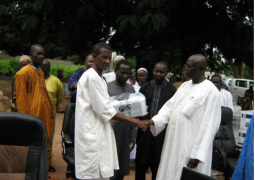The
Gambia government has decided to review the Election Amendment Act of the
country.
It
is specifically going to look at the Election Amendment Act of July 2015, which
under section 43 increased the deposit for Presidential aspirants from D10,000
to D500,000; National Assembly aspirants from D5,000 to D50,000; Mayors from
D2,500 to D50,000; and for the councillors from D1,200 to D10,000.
It
is expected that under the reform and amendment drive of President Barrow most
or all of these exorbitant deposits, for these various categories of aspirants,
will be reduced drastically to allow for fair play and opportunity for more
competent and capable Gambians with good initiatives to partake in the
political scene to develop this country.
Such
huge deposits for aspirants for these offices can, to a large extent, only
contribute to barring or preventing competent, genuine and wise leaders, who
could take our nation from one level to another or transform the country from
grass to grace.
What
such exorbitant deposits mean also is to deter genuine democracy, and denied
capable Gambians of less resources of our rights to seek such political offices
in our homeland.
It
is, therefore, a tool to deter the good progress, growth and development of our
nation, as it would mean only the affluent who could be in a position to
contest for and attain such offices.
We,
therefore, encourage the new administration - which has vowed to promote
democracy, human rights, freedom of expression and other dignified human values
- to go ahead in demolishing those barriers and walls of preventing many a
genuine Gambian from seeking political offices, and in the process rob our
nation of sound and correct leadership which could effectively and efficiently
take the country from one good stage to another.
“I
never doubted that equal rights was the right direction. Most reforms, most
problems are complicated. But to me there is nothing complicated about ordinary
equality.”
Alice
Paul



